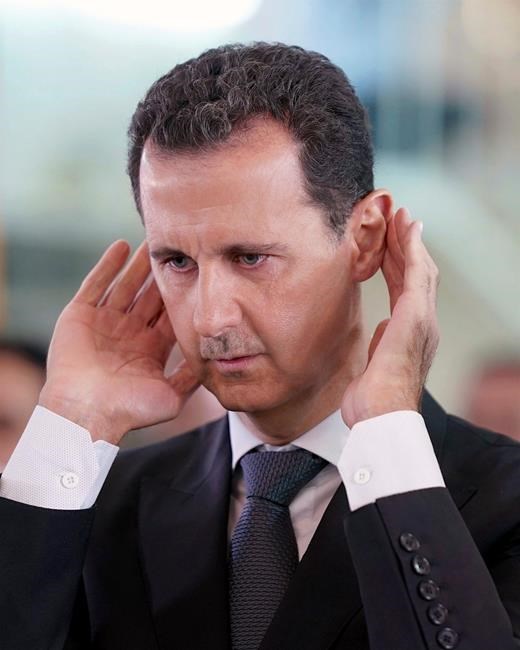
This photo released on the official Facebook page of Syrian Presidency, shows Syrian President Bashar Assad, praying on the first day of Eid al-Adha at Bilal mosque in the western Qalamoun town of Qarat, about 100 kilometers (62 miles) from Damascus, Syria, Friday, Sept. 1, 2017. (Syrian Presidency via AP)
Republished September 01, 2017 - 4:00 AM
Original Publication Date September 01, 2017 - 1:06 AM
DAMASCUS, Syria - Syrian President Bashar Assad travelled Friday to a town recently captured from Islamic State group militants to attend Eid al-Adha prayers.
Assad prayed in Bilal mosque in Qarat, about 100 kilometres (62 miles) from Damascus. He was surrounded by worshippers after the end of the prayers who chanted in his support.
Qarat fell during a joint weeklong offensive between Syria's army and Lebanon's Hezbollah to oust the militants from an area that straddles the Syria-Lebanon border.
The Lebanese army carried out a separate but simultaneous campaign on the other side of the border, securing the shared frontier for the first time in years.
But the offensive was overshadowed by a controversial deal to transport the remaining militants from the area to an IS-held town in eastern Syria near the Iraqi border in exchange for revealing the fate of missing Lebanese fighters.
The Hezbollah-negotiated deal angered Iraq and the U.S. and a convoy carrying around 300 militants and as many family members has been stuck since early this week in a government-controlled area in the desert outside Deir el-Zour province.
The U.S-led coalition carried out airstrikes near the convoy, blocking its advance and targeting militants and their vehicles coming from IS areas to meet them.
On Thursday, the convoy was moved to another Syrian government-held area after their passage to Boukamal, the IS-held town on the border with Iraq, was blocked.
Hezbollah leader Hassan Nasrallah said Thursday that he met personally with Assad in Syria to ask for his help in securing a deal that would help clear the Lebanon-Syria border area and uncover the fate of the Lebanese soldiers, missing since 2014.
Rami Abdurrahman, who heads the Britain-based Syrian Observatory for Human Rights, said some ambulances that were part of the IS convoy were able to cross into IS-held territories in Syria on Thursday. This was followed by the release of the body of a recently captured Iranian Revolutionary Guard member, apparently part of the deal.
Iran's Revolutionary Guard and Hezbollah are fighting alongside Assad's forces. Bodies of Hezbollah fighters were also released as part of the deal.
The standoff came as government and allied troops were advancing in the desert area on the edges of oil-rich Deir el-Zour province, which is mostly controlled by IS. Syrian government forces control part of the provincial capital of the same name and its airport, but have been besieged by IS for years.
Russia, which is providing air support to Assad's forces, says capturing Deir el-Zour is the current military priority.
News from © The Associated Press, 2017